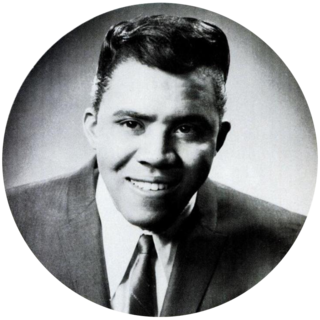
Jimmy Lee Ruffin was an American soul singer, and the older brother of David Ruffin, the lead singer of the Temptations. He had several hit records between the 1960s and 1980s, the most successful being the Top 10 hits "What Becomes of the Brokenhearted" and "Hold On ".

"My Girl" is a soul music song recorded by the Temptations for the Gordy (Motown) record label. Written and produced by the Miracles members Smokey Robinson and Ronald White, it became the Temptations' first U.S. number 1 single, and is currently their signature song. Robinson's inspiration for writing "My Girl" was his wife, Miracles member Claudette Rogers Robinson. The song was included on the Temptations 1965 album The Temptations Sing Smokey. In 2017, the song was selected for preservation in the National Recording Registry by the Library of Congress as being "culturally, historically, or artistically significant".

"Get Ready" is a Motown song written by Smokey Robinson, which resulted in two hit records for the label: a U.S. No. 29 version by The Temptations in 1966, and a U.S. No. 4 version by Rare Earth in 1970. It is significant for being the last song Robinson wrote and produced for the Temptations, due to a deal Berry Gordy made with Norman Whitfield, that if "Get Ready" did not meet with the expected degree of success, then Whitfield's song, "Ain't Too Proud to Beg", would get the next release, which resulted in Whitfield more or less replacing Robinson as the group's producer.
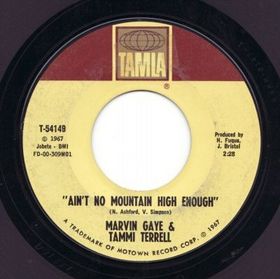
"Ain't No Mountain High Enough" is a song written by Nickolas Ashford & Valerie Simpson in 1966 for the Tamla label, a division of Motown. The composition was first successful as a 1967 hit single recorded by Marvin Gaye and Tammi Terrell, and became a hit again in 1970 when recorded by former Supremes frontwoman Diana Ross. The song became Ross's first solo number-one hit on the Billboard Hot 100 chart and was nominated for the Grammy Award for Best Female Pop Vocal Performance.
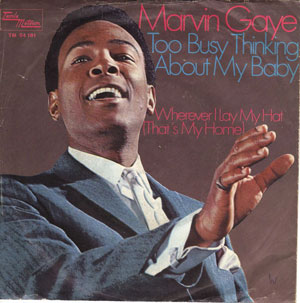
"Too Busy Thinking About My Baby" is a Motown song written by Norman Whitfield, Barrett Strong, and Janie Bradford. The song was first recorded by The Temptations as a track on their 1966 album Gettin' Ready. Eddie Kendricks sings lead on the recording, which was produced by Whitfield. Jimmy Ruffin also recorded a version with The Temptations providing background vocals in 1966. It remained unreleased until 1997.
"(I Know) I'm Losing You" is a 1966 hit single recorded by the Temptations for the Gordy (Motown) label, written by Cornelius Grant, Eddie Holland and Norman Whitfield, and produced by Norman Whitfield.
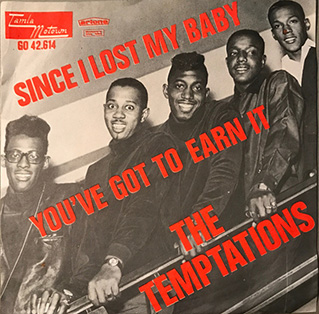
"Since I Lost My Baby" is a 1965 hit single recorded by The Temptations for the Motown Records' Gordy label. Written by Miracles members Smokey Robinson and Pete Moore and produced by Robinson, the song was a top 20 pop single on the Billboard Hot 100 in the United States, on which it peaked at number 17. On Billboard's R&B singles chart, "Since I Lost My Baby" peaked at number four.

"The Way You Do the Things You Do" is a 1964 hit single by the Temptations for the Gordy (Motown) label. Written by Miracles members Smokey Robinson and Bobby Rogers, the single was the Temptations' first charting single on the Billboard Hot 100, peaking in the Top 20 at number eleven; it also went to number one on the Cash Box R&B chart. The song has been an American Top 40 hit in four successive decades, from the 1960s to the 1990s. A version by Hall & Oates featuring Temptation members Eddie Kendricks and David Ruffin was nominated for a Grammy Award in 1986. A cover version by British reggae band UB40 hit number six in the U.S. in 1990.

"Ooo Baby Baby" is a song written by Smokey Robinson and Pete Moore. It was a 1965 hit single by The Miracles for the Tamla (Motown) label.
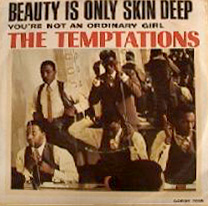
"Beauty Is Only Skin Deep" is a 1966 song, written by Norman Whitfield and Edward Holland, Jr., and produced by Whitfield. Norman Whitfield recorded the song's instrumental track. Two years later, Whitfield got together with Eddie Holland to have lyrics written for the song.
"Baby, I'm for Real" is a soul ballad written by Marvin Gaye and Anna Gordy Gaye, produced by Marvin and recorded and released by American Motown vocal group The Originals for the Soul label issued in 1969.
"What's Easy for Two Is Hard for One" is a song written and produced by Smokey Robinson and released as a single by singer Mary Wells for the Motown label.

"Gonna Give Her All the Love I've Got" is a 1967 Soul song, originally recorded and made a hit by Jimmy Ruffin on Motown's Soul Label imprint. Ruffin's 1967 original version, from his album Jimmy Ruffin Sings Top Ten, reached the Pop Top 30, peaking at #29, and was a Top 20 R&B Hit as well, peaking at #14. It was also a hit in Britain, reaching #26 on the UK Singles Chart. The song has a social context: it depicts a man anticipating his release from prison on the morrow, when he'll return home on a train to "the girl that I left behind," promising himself that he will reward her steadfast love for him by "giv[ing] her all the love [he's] got." The song was written by Norman Whitfield and Barrett Strong and produced by Whitfield.
William Henry Weatherspoon was an American songwriter and record producer, best known for his work for Motown Records in the 1960s. He co-wrote "What Becomes of the Brokenhearted", an international hit for Jimmy Ruffin, and many other hit songs.
"Standing on the Top" is a funk song recorded by the Motown group The Temptations, written and produced by musician Rick James.
"Don't You Miss Me a Little Bit Baby" is a 1967 soul song originally recorded by Motown singer Jimmy Ruffin and released on the company's Soul subsidiary label.
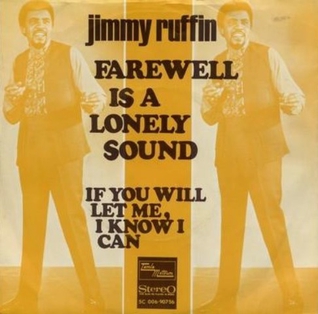
"Farewell Is a Lonely Sound" is a song by American soul singer Jimmy Ruffin, released as a single in October 1969 from his album Ruff'n Ready. It peaked at number 8 on the UK Singles Chart.
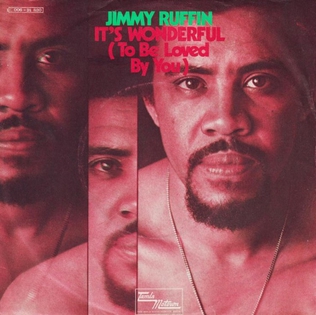
"It's Wonderful (To Be Loved by You)" is a song by American soul singer Jimmy Ruffin, released as a single in October 1970, taken from his 1969 album Ruff'n Ready.
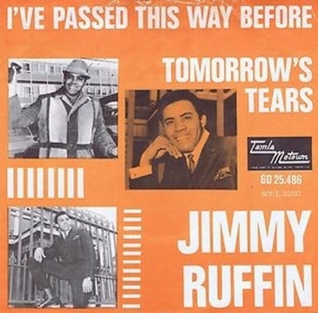
"I've Passed This Way Before" is a song by American soul singer Jimmy Ruffin, released as a single in November 1966 from his album Jimmy Ruffin Sings Top Ten. It peaked at number 17 on the Billboard Hot 100 and number 29 on the UK Singles Chart.
This is the discography of American soul singer Jimmy Ruffin.














